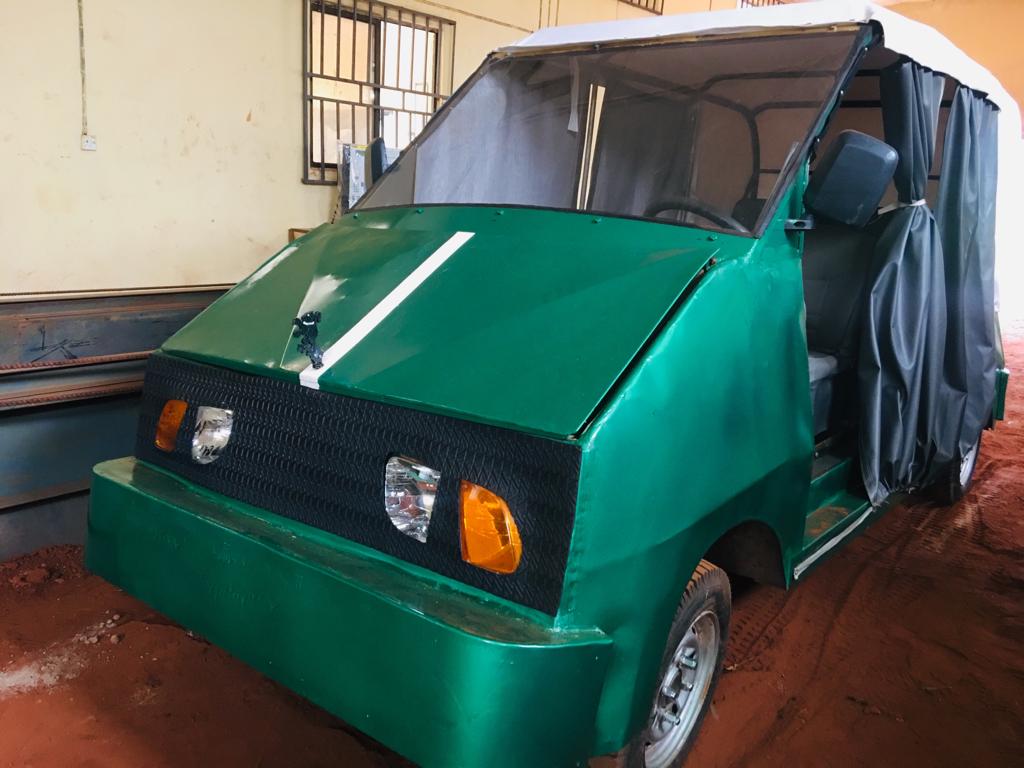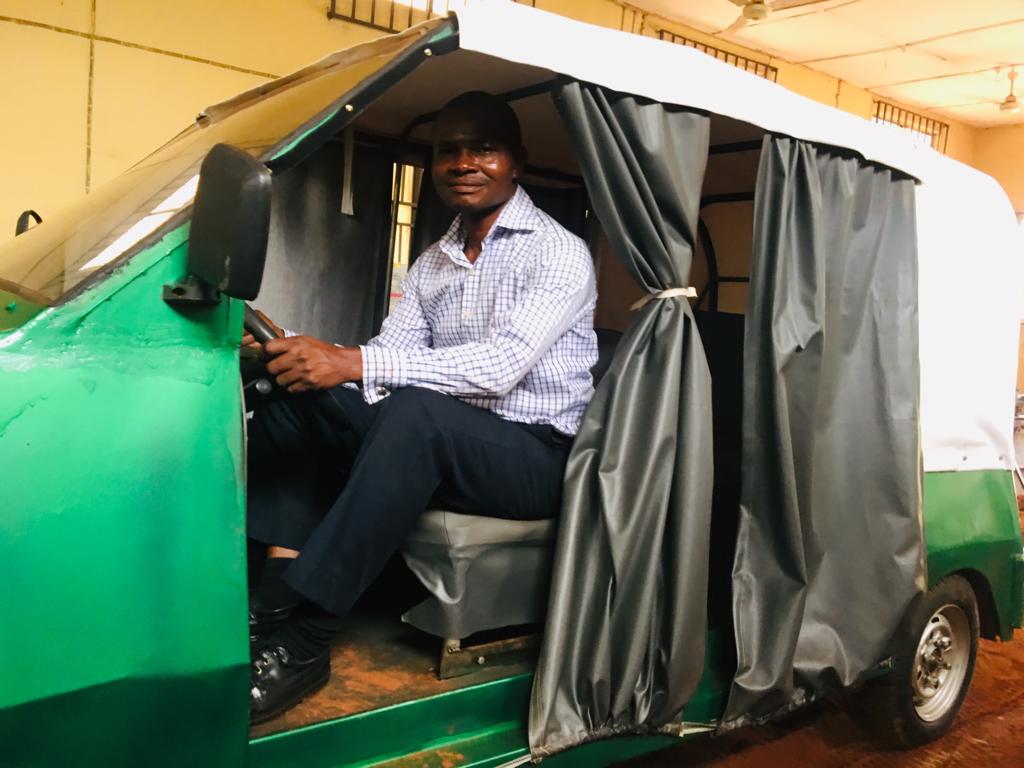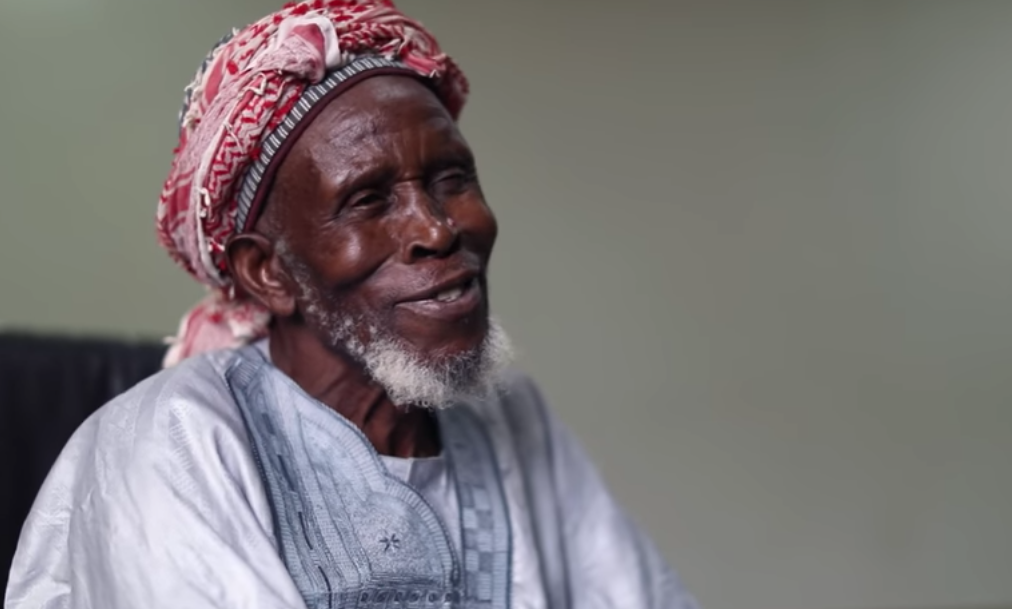Nigeria recently got its first locally manufactured electric vehicle courtesy of the University of Nigeria, Nsukka (UNN). Christened Lion Ozumba 551, the five-seater vehicle runs on four wheels like every other car and when fully charged, can be driven for up to 60 minutes at the top level campus speed of 30km per hour. Indeed, the joy of the university community knew no bounds. But how did such feat come about?
It all started with a proposal sent to the National Automotive Design and Development Council (NADDC) by one of the university lecturers seeking funding for a project on an electric multi-function tractor for smallholder farmers. It turned out the council at the time was considering importation of electric vehicles for campus shuttle, so UNN stepped up to take that challenge.
Val Ekechukwu, a professor of engineering and dean of the faculty of engineering at the university, told TheCable UNN was subsequently given the mandate alongside five other institutions – University of Lagos (UNILAG); University of Ibadan (UI); Usmanu Danfodiyo University, Sokoto; Federal Polytechnic, Birnin Kebbi; and Nigerian Meteorological Training/Research Institute – to design and roll out a prototype of an electric vehicle for campus shuttle.
IT TOOK ONLY N1.6M AND ONE MONTH FOR THE ‘LION TO ROAR’
Advertisement

With that mandate, the institutions went to work, each working towards the same goal: finding an alternative to the importation of electric vehicles as campus shuttles in Nigeria.
Chukwuma Ozumba, then UNN vice-chancellor, released N1.6 million to the mechatronics engineering laboratory team which comprised of 27 members. Half of that amount was used in procuring materials of which 80 percent of them were locally sourced, according to Ekechukwu.
“And after conceptualisation, from design of the vehicle to when it was produced took one month,” Ekechukwu said, adding that “everybody was under some heat. The design and everything were totally done here in the faculty. We must believe in ourselves, and we needed no experts from anywhere.
Advertisement
“We are no longer talking about whether we can construct it; we can do it. And this has totally killed the dream of the automotive council to import electric vehicles from abroad.”
‘HOW TO PRODUCE AN ELECTRIC CAR’

Ozoemena Ani, the associate professor who headed the team that manufactured the vehicle, tells TheCable among those who worked on the project were lecturers, technologists, researchers, undergraduate and postgraduate students as well as other support staff.
Ani who himself had been a member of the various research groups set up by the university administration in 2015, had just returned from the Michigan State University in the US where he joined a team working on electric tractor for smallholder farmers. Armed with that knowledge, he went to work with members of the mechatronics research group but not without experiencing numerous challenges.
Advertisement
“Putting on ground a product like the one we have made requires the use of a lot of tools powered by electricity (so) we had to partner with the private sector that provided a generator that was running from morning till late evening,” he says in a tone heavy with satisfaction.
“Also, most of the power tools we used are not readily available on campus. Many of what we used are not the modern ones. We had to improvise a lot of tools because they were not available.”
He says, for instance, that rather than use the normal battery for electric cars which was not in the country, the team improvised with the battery for solar panel installation. “The normal battery costs from $1,700 to about $5,000 depending on the capacity and you can’t find it in Nigeria.”
Advertisement
For it to function effectively when mass-produced, the university plans on mounting ‘charging ports’ on strategic areas within its premises so that “if it runs out of power, you go to the nearest electricity port and, like in filling stations, plug in your charger and charge the vehicle.”
WHAT NEXT?
Advertisement
Elechukwu says the university is not thinking of resting on its oars at this stage while it already has a similar project like the electric vehicle in the pipeline.
“I must say we are not yet there and even when it is in the market,” he admits. “You keep improving on it based on feedback. So we will look at improvements: the charging system, controls, even some mechanical devices in it to perfect them. And in a short while, we will be able to sell the entire design to any local manufacturing company willing to mass produce them.
Advertisement
“Once we perfect it, we are trying to reach out to Innoson Motors to see if there is a way of partnering with us into further development of this. Development can keep happening; even the big automobile companies still produce newer models. In fact, there is a Chinese company willing to partner with us.”
IS NIGERIA READY FOR ELECTRIC VEHICLES?
Advertisement
The number of countries that have proposed a ban on cars running on diesel and petrol has increased significantly in recent years, with most of them citing factors as health risks that result from car emissions, energy independence, and the reduction of a carbon footprint as major reasons for switching to electric vehicles instead. But how prepared is Nigeria to take such measure?
Joe Chukwuebuka, a final year student of mechanical engineering who was part of the team that produced the electric vehicle at UNN, tells TheCable it is time for Nigeria to “level up.”
“Nigerians have to start looking ahead and join global trends,” he says.
Interestingly, the last senate kicked against a bill seeking to phase out petrol cars and introduce electric vehicles by 2035. Sponsored by Ben Bruce from Bayelsa east, the bill had sought to provide a framework for all Nigerians to switch from use of petrol vehicles to electric vehicles by 2035. But most lawmakers in the upper legislative chamber argued that with the current situation of things in the country, it will difficult to phase out use of electric vehicles and will be even more difficult for the government to mandate all Nigerians to use electric cars by 2035.
Moreover, existing factors including Nigeria’s far-from-dependent power supply casts doubt over the possibility of a Nigeria with just electric vehicles. But Ekechukwu believes that challenge could be addressed nonetheless. “Electricity is not readily available,” the dean says. “It can be scarce just as we have fuel scarcity. So, for me it is not something to worry about. Although it is a challenge but there will be a way out.”
1 comments







Kudos to all the Engineers involved in the design and production of the electric vehicle! It is hoped that our government in particular and other spirited individuals will encourage and support this laudable development.